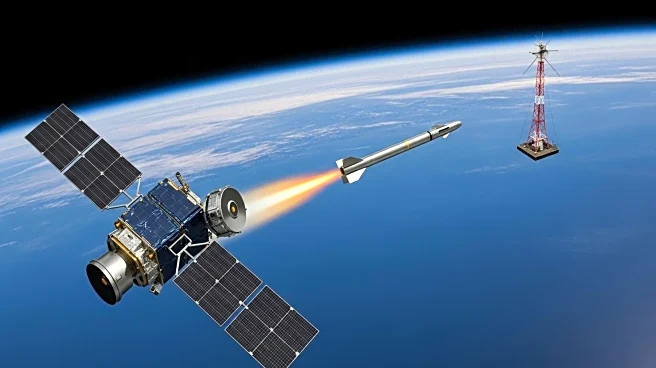What's Happening?
The United States has decided to provide Ukraine with intelligence to facilitate long-range missile strikes on Russia's energy infrastructure. This development, reported by the Wall Street Journal and Reuters, aims to assist Ukraine in targeting refineries, pipelines, power stations, and other critical infrastructure. The move is part of a broader strategy to deprive the Kremlin of revenue and oil, amidst ongoing tensions and military actions in the region. The U.S. has been sharing intelligence with Kyiv for some time, but this new initiative marks a significant escalation in support. Additionally, U.S. officials are urging NATO allies to offer similar assistance. This decision comes in the context of recent Russian attacks on Ukrainian nuclear facilities, including the Chornobyl and Zaporizhzhia plants, which have raised global security concerns.
Why It's Important?
The U.S. decision to provide intelligence for missile strikes on Russian energy infrastructure is a pivotal moment in the ongoing conflict between Ukraine and Russia. By enabling Ukraine to target critical Russian assets, the U.S. is intensifying its support for Ukraine, potentially altering the dynamics of the conflict. This move could significantly impact Russia's economic stability by disrupting its energy exports, which are vital for its economy. Furthermore, it underscores the U.S.'s commitment to countering Russian aggression and supporting Ukraine's sovereignty. The broader implications include heightened tensions between NATO and Russia, as well as potential retaliatory measures from the Kremlin. This development could also influence global energy markets, given Russia's role as a major energy supplier.
What's Next?
The provision of intelligence for missile strikes is likely to lead to increased military activity in the region, with Ukraine potentially launching more targeted attacks on Russian infrastructure. This could provoke a strong response from Russia, possibly escalating the conflict further. NATO allies may also face pressure to increase their support for Ukraine, both in terms of intelligence sharing and military aid. The international community will be closely monitoring the situation, as any significant escalation could have far-reaching consequences for global security and economic stability. Additionally, diplomatic efforts may intensify to find a resolution to the conflict, as the risks of prolonged warfare become more apparent.
Beyond the Headlines
The U.S. decision to assist Ukraine with intelligence for missile strikes raises ethical and legal questions about the extent of foreign intervention in sovereign conflicts. It highlights the complexities of international law regarding military aid and the potential consequences of such actions. This development also reflects the evolving nature of warfare, where intelligence and technology play crucial roles in shaping outcomes. The situation underscores the importance of cybersecurity and information warfare in modern conflicts, as nations increasingly rely on intelligence to gain strategic advantages.









